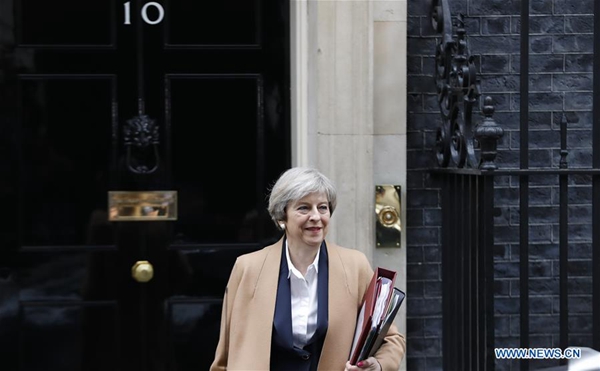Will Brexit really mean changes?
china.org.cn / chinagate.cn by Mitchell Blatt, April 10, 2017 Adjust font size:
|
|
|
British Prime Minister Theresa May leaves 10 Downing Street after the cabinet meeting in London, Britain on March 29, 2017. British Prime Minister Theresa May and her most senior ministers gathered in the Cabinet room at 10 Downing Street Wednesday at the start of one of the most historic days in generations for Britain. [Xinhua/Han Yan] |
The United Kingdom is one week into the official bargaining process for leaving the European Union, and already potential compromise can be seen.
In a BBC interview with Andrew Neil, Prime Minister Theresa May was unable to guarantee that immigration would be lower when Britain is outside of the EU than it is now from within. Opposition to current immigration levels was an important factor generating the "leave" vote, and 62 percent of those opting for this thought immigration "a force for ill," according to a major survey by Lord Ashcroft Polls.
May's interview got a lot of attention because it came at the same time as her invocation of Article 50, and it sounded like a backtrack from some of the harsher Brexit rhetoric she'd been using previously.
For example, last January, she declared: "The message from the public before and during the referendum campaign was clear: Brexit must mean control of the number of people who come to Britain from Europe. And that is what we will deliver."
Of course, there's always the risk of reading too much into May's words. After all, there really is no way for her to guarantee anything in regard to future policies. This will naturally unfold in coming negotiations that will be influenced by the results of the forthcoming French and German elections, not to mention future British elections.
However, it does seem Britain will have to make major concessions in reality if it is to keep all the benefits it derives from its relations with the EU that it doesn't want to lose in leaving.
A majority of British exports and imports come from European countries. A total of 900,000 Britons live long-term in Europe, and Britain needs the labor resources offered by EU citizens. If May tries to take too hard a line on negotiations, the EU might not play along.
The U.K. will then face the classic problem politicians everywhere face at some point: If they promise too much, there's a danger they will end up under-delivering. Those favoring Brexit promised voters all kinds of changes at little or no cost. They could still have access to the common market and everything else they needed, for example. However, there was no serious discussion of what they would have to do, what they would have to pay, and the kinds of regulations they would have to deal with in order for the EU to agree to offer continued access.
There's a reason the EU has evolved to where it is today. Leaders and people who knew what they were doing pursued the policies that were best for their countries. Immigration and trade generally helped.
It was good for the U.K., too. Chris Giles, economics editor of the Financial Times, wrote on March 31, that joining the European Economic Community (EEC) and then the EU enabled Britain to catch up to its peers after years of falling behind. "By 2013, Britain became more prosperous than the average of the three other large European economies for the first time since 1965."
During negotiations, however, Theresa May will be stuck between doing what is best for her country and what is best for her Conservative Party. Many of the voters at home will want to see big changes. She will have to make it seem like she's putting through those changes, or else large swathes of voters might turn elsewhere.
What might end up happening is that the U.K. will look for window-dressing measures to make it seem like things are changing, but the results could be trivial. May spent a lot of time, for example, talking about how the U.K. will "have the right" to decide "its own" policies towards immigration and other issues. In essence, she promised a process, not results.
Conservative MPs will tell the voters in their constituencies that they have more "sovereignty" and "autonomy" from the dreaded decisions emanating from Brussels. However, if the end result is that the policies in the U.K. remain relatively unchanged, what was all the fuss for?
